|
|
|
Sort Order |
|
|
|
Items / Page
|
|
|
|
|
|
|
| Srl | Item |
| 1 |
ID:
107903
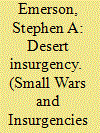

|
|
|
|
|
| Publication |
2011.
|
| Summary/Abstract |
This article provides an in-depth examination and analysis of the 2006-2009 Tuareg rebellion in Mali and Niger. It identifies the underlying reasons behind the rebellion, explores contrasting counter-insurgency (COIN) strategies employed by the two governments, and presents some lessons learned. While both COIN approaches ultimately produced similar peace settlements, the article argues that the Malian strategy of reconciliation combined with the selective use of force was far more effective than the Nigerien iron fist approach at limiting the size and scope of the insurgency and producing a more sustainable peace. It concludes by looking at the role of external actors, particularly the United States, and how the failure to internationalize the conflict was actually more beneficial to the local COIN effort, as well as to the longer strategic interests of the United States in the region.
|
|
|
|
|
|
|
|
|
|
|
|
|
|
|
|
| 2 |
ID:
144330
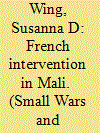

|
|
|
|
|
| Summary/Abstract |
The March 2012 coup in Mali opened the door to expanded territorial occupation in northern Mali by Tuareg separatists and subsequently armed Islamist extremists. French forces intervened at the behest of the interim government in Mali. This article examines how various actors frame the conflict to their advantage. While the Malian government and France are allies, the position of various Tuareg actors shift over time as they strategize and weigh the value of allegiance with the French. Local extremist organizations are labeled as terrorists and are targeted as enemies. This article argues that the conflict has been decontextualized and framed within the ‘war on terror’. France’s decision to intervene and to expand their regional military presence, rather than exit, is legitimized by the framing of their intervention as integral to counterterrorism efforts.
|
|
|
|
|
|
|
|
|
|
|
|
|
|
|
|
| 3 |
ID:
126456
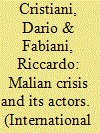

|
|
|
|
|
| Publication |
2013.
|
| Summary/Abstract |
The structural problems characterising Mali interlocked with the dynamics of crisis triggered by the war in Libya in 2011, causing the collapse of one of the few African democracies. The Tuareg rebellion of 2012, the coup d'état and the Islamist takeover of Northern Mali were the three key phases of this crisis, which pushed France - the former colonial patron - to intervene military. After analysing the major local actors involved in the crisis, the article critically analyses the engagement of the EU in the crisis.
|
|
|
|
|
|
|
|
|
|
|
|
|
|
|
|
| 4 |
ID:
123459
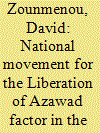

|
|
|
|
|
| Publication |
2013.
|
| Summary/Abstract |
Mali has been a battleground for more than a year now. While the armed conflict came in the aftermath of the Libyan crisis that left the regional security environment depleted, it also served as a catalyst for the collapse of state authority in Mali. This created conditions conducive for the proliferation of, and attacks by, radical religious armed groups in the northern regions of the country, including the Tuareg armed movement: the National Movement for the Liberation of Azawad (MNLA). But, far from being a new phenomenon, the Tuareg-led armed insurrection in the northern regions is as old as the post-colonial Malian state, and continues to pose tremendous challenges in West Africa and the Sahel region for both regional and extra-regional actors. The recent crisis in the Sahel region is seen as one of the most serious since the end of the Cold War, with anticipated dire long-term impacts on the security of the region and beyond. While attention is predominantly focused on defeating the jihadist groups that have threatened the survival of the Malian state, one must not lose sight of the fact that the 'Tuareg Factor', as represented by the rebellion launched by MNLA, remains critical both in terms of appreciating the deterioration of the situation and attempting to frame long-lasting solutions. The paper argues that the Tuareg's persistent recourse to rebellion against Bamako needs to be understood within a historical trajectory that takes into consideration three key parameters: firstly, the post-colonial state in Mali and its African leadership's relations with the descendants of the Tuareg communities; secondly, the amalgamation created by the so-called war on terror; and, finally, the contradictions of the democratisation process of the 1990s.1
|
|
|
|
|
|
|
|
|
|
|
|
|
|
|
|
| 5 |
ID:
138860
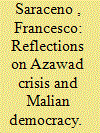

|
|
|
|
|
| Summary/Abstract |
The 1992 decentralization reform in Mali failed to address the deficiencies embedded within the state. The resurgence of the Azawad crisis and the coup d’état of March 2012 have made these limits striking. After a brief account of the causes behind the century-long decay of Tuareg people, I will show that the 2013 elections may only represent an ephemeral solution unless strong policies of institution strengthening are deployed and the northern elites are put in condition to exert legitimate authority. The decentralization reform and peace agreements of the 1990s and 2000s have further increased the weakness of security forces. Moreover, they proved unable to provide northern elites with adequate means for securing legitimation and activating a process of institutional anchoring.
|
|
|
|
|
|
|
|
|
|
|
|
|
|
|
|
|
|
|
|
|